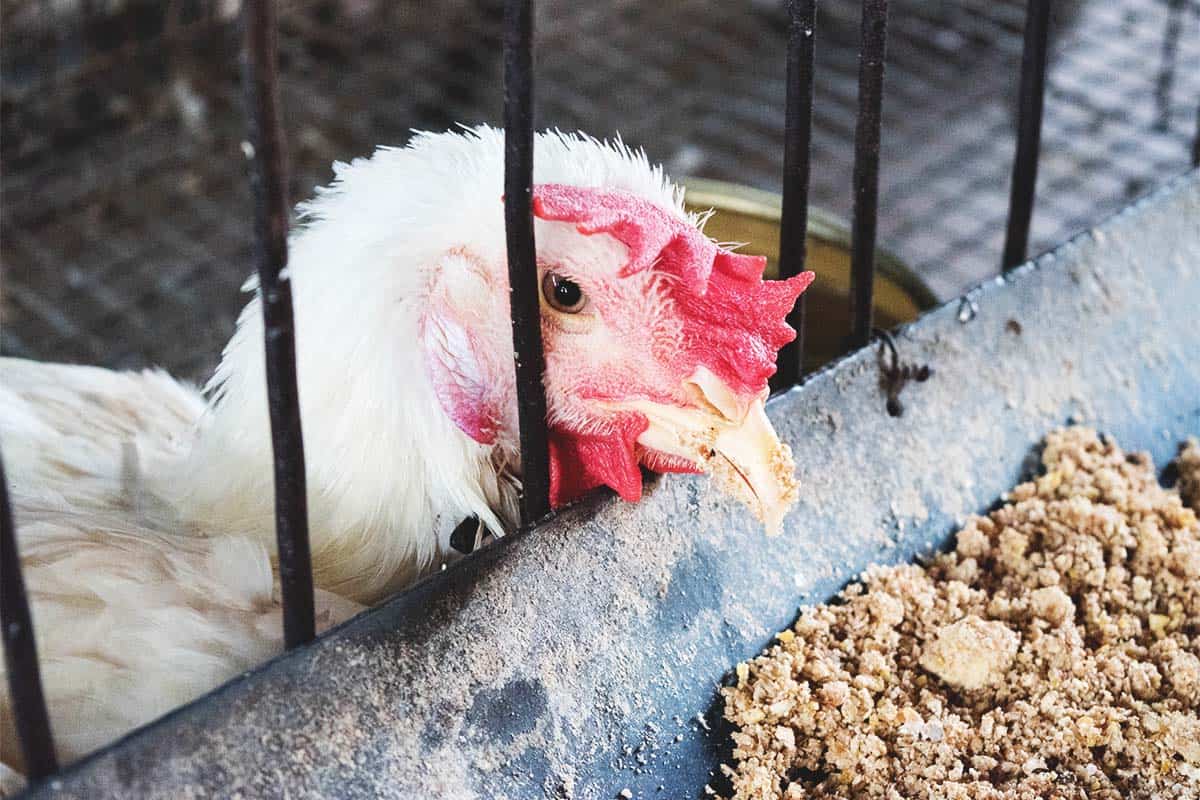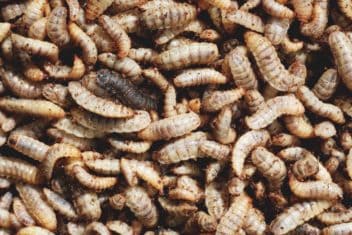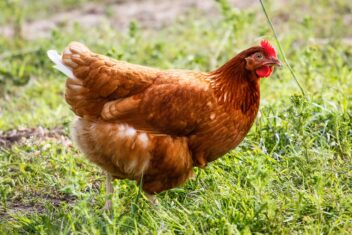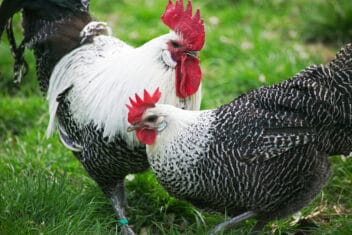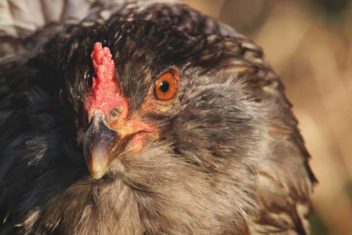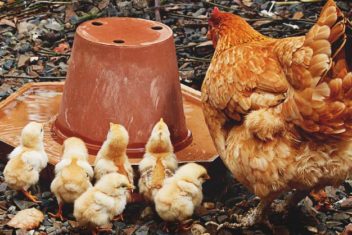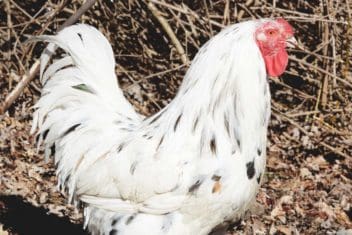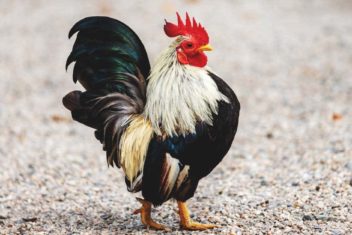Chickens fare pretty well on their own when it comes to fighting diseases and parasites. But there’s one nasty bug that is a well-known, common, nemesis of your flock, and that is coccidiosis.
Unfortunately, coccidiosis is a common killer amongst many different types of animals, and it can be specifically lethal to chickens.
The good news is, coccidiosis in chickens is easy to identify and treat. This guide will give you the low-down on all things coccidia.
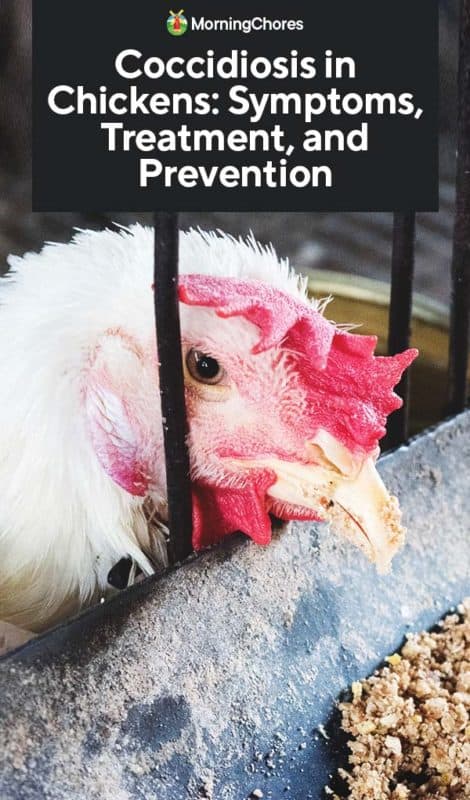
What Is Coccidiosis?
In short, coccidiosis is a protozoic parasite that infects the intestines of the animal it has “chosen” for its host. The protozoa set up house in the intestinal lining, and damages the organ, rendering it unable to absorb the nutrition your chickens need to thrive.
The lifecycle of the protozoa is similar to that of other parasites; it starts as an egg and is expelled in the droppings of an infected bird. Then, an otherwise healthy chicken may inadvertently ingest the eggs while scratching about the coop.
The coincidental part of all this is that all chickens carry coccidiosis within them, but some birds will become ill and some will simply be carriers.
Coccidiosis infects flock members through infected droppings of flock mates, new flock mates, and even from wild birds or other animals.
However, it is rare for coccidiosis strains to be passed between two different species. It mostly manifests as a specific strain that is species-specific. In other words, it is unlikely that you would get sick from your birds due to coccidiosis.
On the other hand, if you have game birds or other types of poultry, the coccidiosis could pass between them.
Signs and Symptoms of Coccidiosis in Your Flock
Chickens have all different variations of droppings, in fact, there’s a lot to learn from observing your chickens’ scat. For the sake of simplicity, however, we are going to focus on the symptoms of coccidiosis specifically.
Blood in your chickens’ droppings is typically the first sign of coccidiosis in your chickens. However, blood may also exist after laying an unusually large egg, so before you assume it’s the deadly protozoa, check the nesting box for eggs that are a little larger than usual. They will often have blood on them as well.
Aside from blood in the droppings, watch for the following symptoms:
- Diarrhea
- Lethargy
- Cold appearance
- Feathers fluffed up or ruffled
- Rapid weight loss
- Loss of appetite
- Withdrawn from flock
- Pale combs and wattles
- Reduction in egg production
While these symptoms may be the cause of other problems, coupled with blood in the droppings makes a strong case for coccidiosis.
If you aren’t sure, you can always enlist your poultry-savvy veterinarian, or call ahead to ask to have the droppings tested for coccidiosis.
Coccidiosis is a deadly illness. Parasitic protozoa can damage the digestive system so severely, that the host animal will not survive without treatment.
And even those that are treated in time may never be the same. They may not lay as many eggs as before or be more prone to illnesses in the future due to the damage of the intestines.
Treatment for Coccidiosis
Coccidiosis moves quickly, and once the symptoms are visible, your chicken is already in distress and the rest of your flock is at risk.
The good news is, if caught early and treated aggressively, you can stop the problem from spreading and killing your entire flock.
Your vet can prescribe Amprolium, or you can find this over-the-counter in agriculture stores. It can easily be added to your chickens’ drinking water so you can treat the entire flock at once.
It’s important to remove your flock from their current living quarters and clean vigorously. In warm climates, coccidiosis is known to live in the soil and structures for months, and even years. Reinfection is possible if sanitation is not performed vigorously.
Some veterinarians suggest treating infected flocks with Amprolium regularly for an entire year to ensure all traces of the protozoa have been eliminated, and reinfection does not occur.
Preventing Coccidiosis Among Your Flock
Since coccidiosis is spread through feces, you’ve probably already guessed that it can be prevented with good flock and coop hygiene.
The following examples are surefire ways to prevent coccidiosis from infecting your flock and spreading.
1. Quarantine New and Returning Flock Members
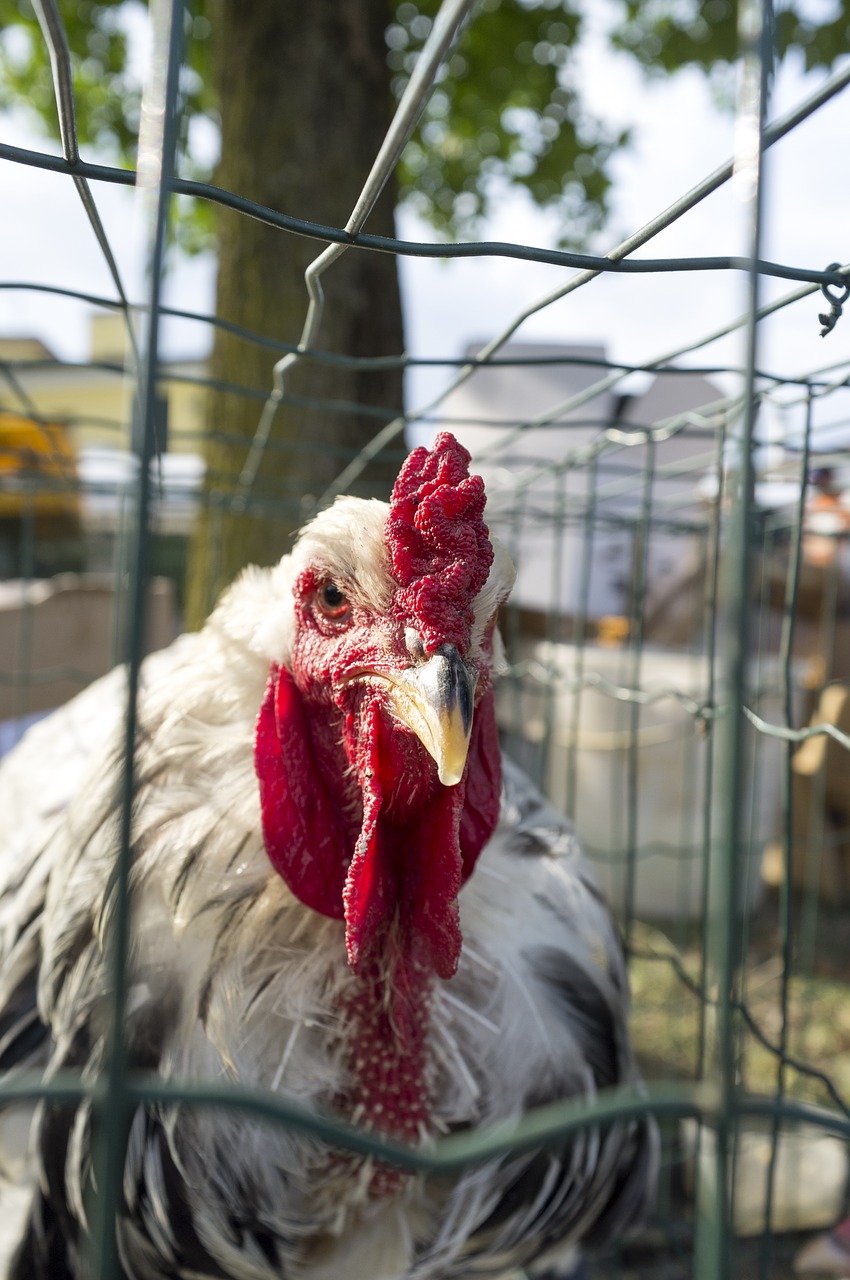
No matter what, there’s always something to be said for keeping new chickens separate from your established flock. This goes for chickens returning from events like fairs or expos as well.
Keep new, or returning, birds separated from the rest of your flock for at least 30 days while you assess and observe the isolated bird.
2. Give ‘Em Some Space
It can be tempting to keep a lot of chickens in a small area, especially if you’ve fallen victim to chicken math, but the truth is, overcrowding is not only a good way for coccidiosis to spread but also other poultry diseases.
Never overcrowd your flock… give them enough space to stretch their wings, and keep a clean coop.
3. Keep Their Coop Clean
There’s nothing more valuable to your flock’s health than a clean coop. Aside from overcrowding, a coop filled to the brim with poop is also a recipe for coccidiosis.
Wet, feces-filled spaces are perfect environments for not only coccidiosis to thrive in, but also other internal and external parasites. So keep it clean, and read our 9 tips for cleaning a chicken coop.
4. Use Your Feeders
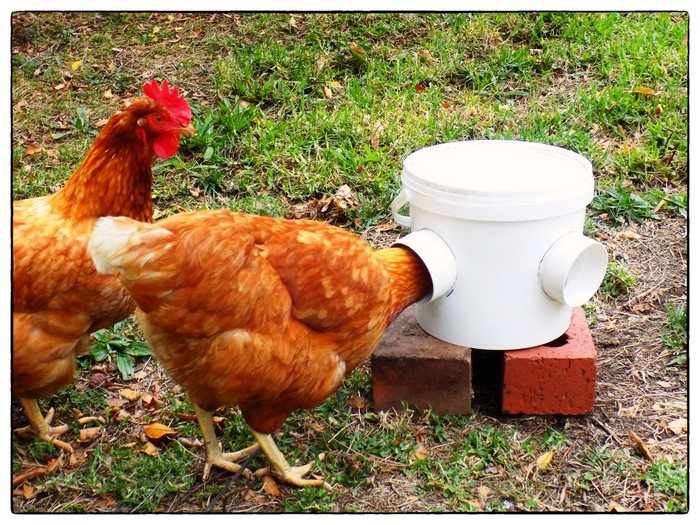
I’ve made the mistake of throwing chicken crumble willy nilly about the coop. I envisioned days gone by, whipping corn out to the flock and allowing them to hunt and peck for their food. But the truth is, simply throwing feed onto the ground leads to mixing with potentially infected droppings.
Keep feed off the ground, and in clean, dry feeders. It goes a long way in preventing a plethora of bacterial illnesses, and of course the spread of parasites.
For brilliant and hygienic feeder ideas such as a no-mess feeder, have a look at our chicken care hacks post.
5. Fresh Water, Every Day
If you’re a seasoned chicken owner, you know that the waterer seems to be a magnet for chicken poop and filth.
If an infected bird drops their poo into a clean waterer, it’s only a matter of time before the rest of the flock becomes ill. Changing the water every day is just one simple preventative measure for keeping your flock healthy.
6. Vaccinate Hatchery Chicks
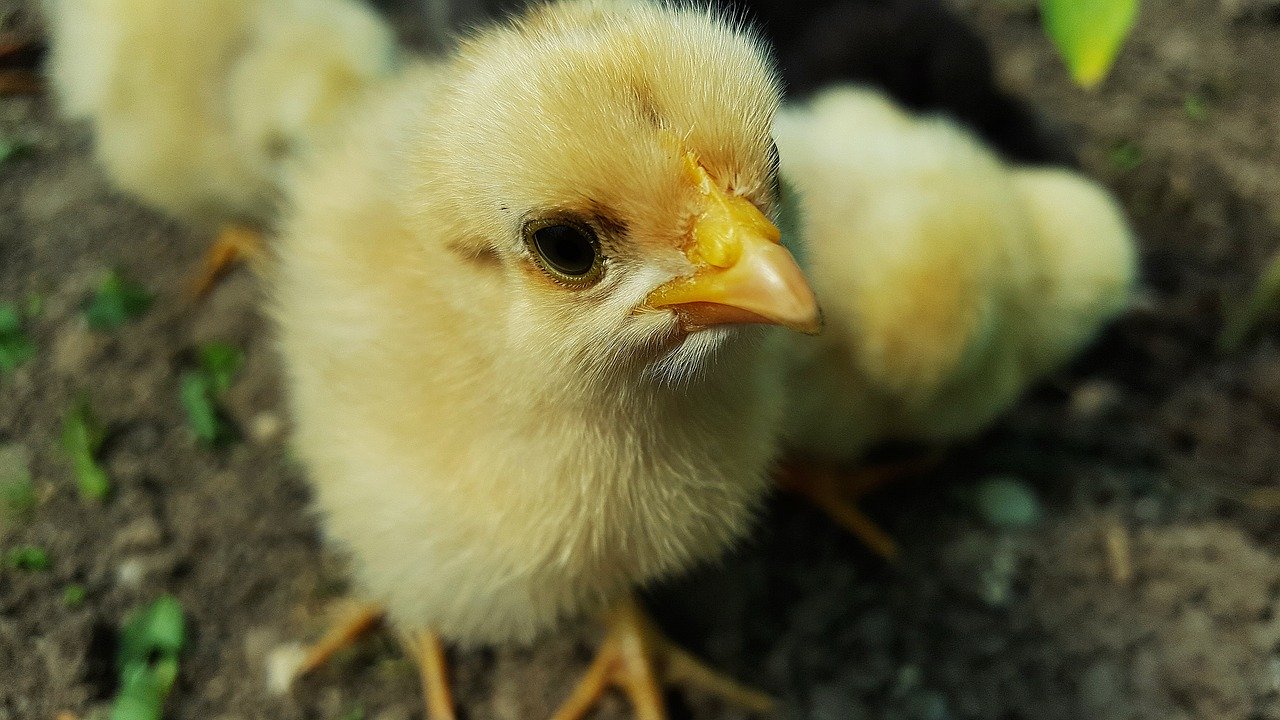
Some hatcheries offer the option to vaccinate your new chicks before they are shipped to you. Baby chicks are extremely susceptible to picking up coccidiosis because of their young immune systems. Consider spending a few extra bucks to vaccinate your new babies before they come home.
While vaccination cannot guarantee that your chicks will not contract coccidiosis, it can aid in the prevention.
7. Medicated Feed
I know you may prefer the idea of organic or natural chick feeds for your babies, but there’s a strong argument to make for medicated starter feed. Young chicks do not have a strong immunity built up, and medicated feed helps support their immune systems so that they have a fighting chance if they are introduced to coccidiosis.
Conclusion
Prevention is always key when it comes to any chicken illnesses or parasites. A clean coop can keep your chickens comfy and healthy. And if your flock does happen to come down with a bout of coccidiosis, rest assured that if you act fast, everyone can get back to normal in time.
